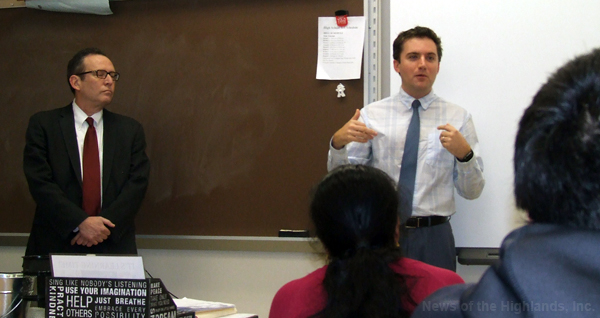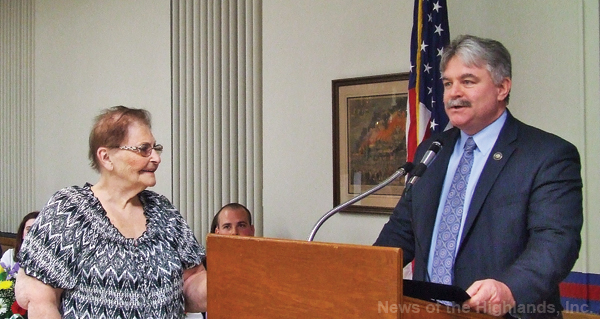
If Assistant Attorney General Gary Brown is a statewide elder abuse coordinator, what was he doing in a high school classroom on Nov. 28?
Mr. Brown told a room filled with Monroe-Woodbury juniors and seniors that scams affecting the elderly amounted to $1.5 billion in New York State in 2016. He said the scams are prevalent during the holidays, and the Attorney General’s Office is trying to help senior citizens by educating their grandchildren.
Assemblyman James Skoufis, a Monroe-Woodbury graduate, accompanied Mr. Brown. During the visit, the Assemblyman saw many of his former teachers. He was part of the audience when three students re-enacted a scam in front of the room.
Mr. Brown had given them the script and told them that the telephone call was taking place at 5 a.m. When the student playing the grandmother answered the phone, the male on the other end said “It’s your favorite grandson.”
The woman inadvertently blurted out a name, while the caller told her that he was in trouble. He was responsible for an accident in which he hit his nose against the airbag while the driver of another vehicle was injured and taken to the hospital. “Please don’t tell my parents,” the scammer pleaded. (Of course, he didn’t want her to call her grandson’s parents because it would give away the hoax.)
“It doesn’t sound like you, Johnny,” the grandmother protested. But the hoaxster explained that after the accident he could hardly breathe. He handed the phone to a fake attorney, who said that the injured party would drop the charges for a payment of $2,000. The lawyer then told the victim to go to a pharmacy (at a specific address), where she could buy four gift cards for $500 each, and then call him back with the serial numbers.
The perpetrators are almost never caught, Mr. Brown told the audience. Most of them call from out of the country and they use “burner phones,” which they discard when the minutes are used up.
So what should the teens tell their grandparents? Mr. Brown suggested that the family think of a password or a trick question that only family members could answer. He said the simplest solution is for grandparents not to answer the phone if they don’t recognize the number of the caller.
Mr. Skoufis added an observation. “The people who are going to get tricked,” he said, “are the ones who don’t know the scams exist.” If the teens just talk to their grandparents, the older folks are unlikely to be fooled.


